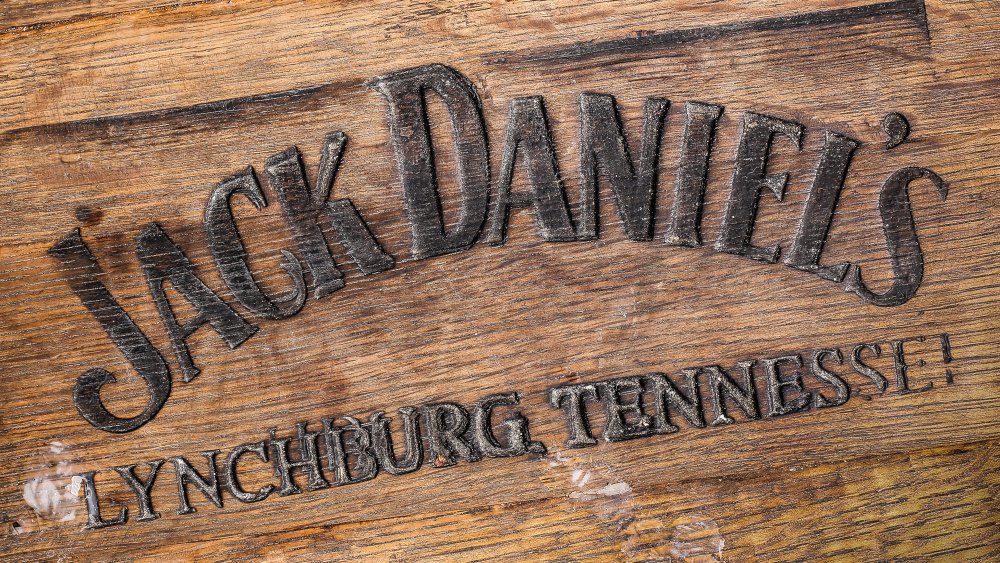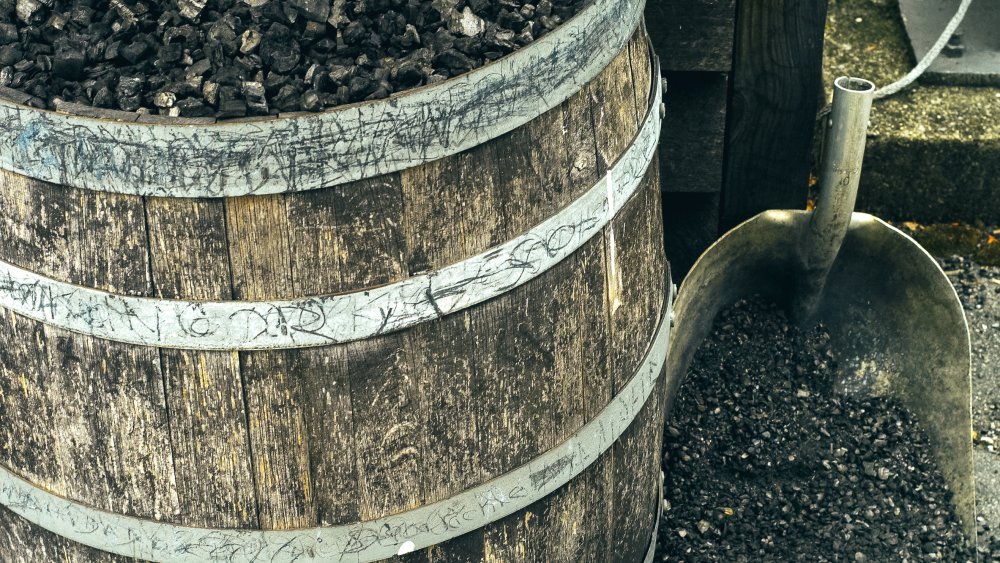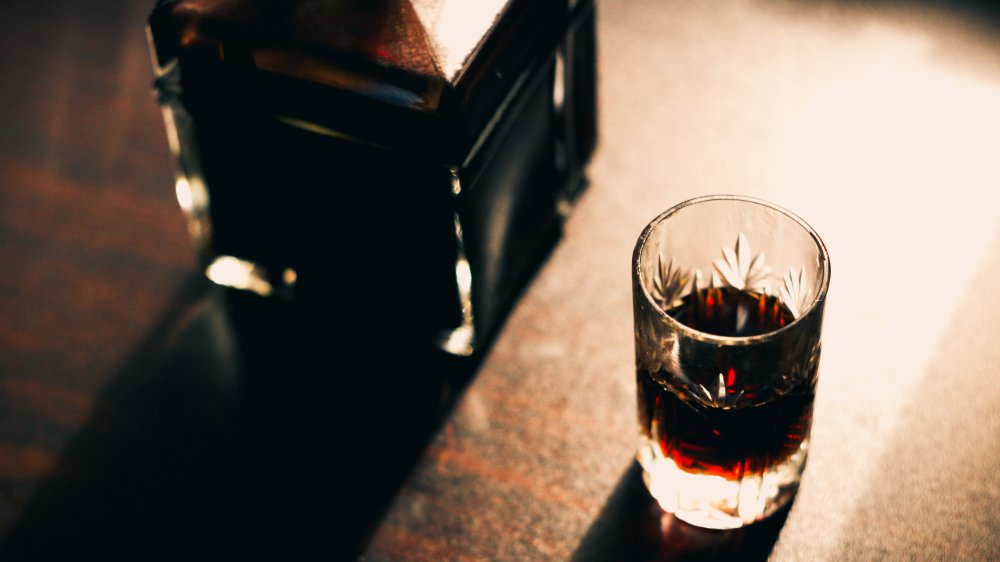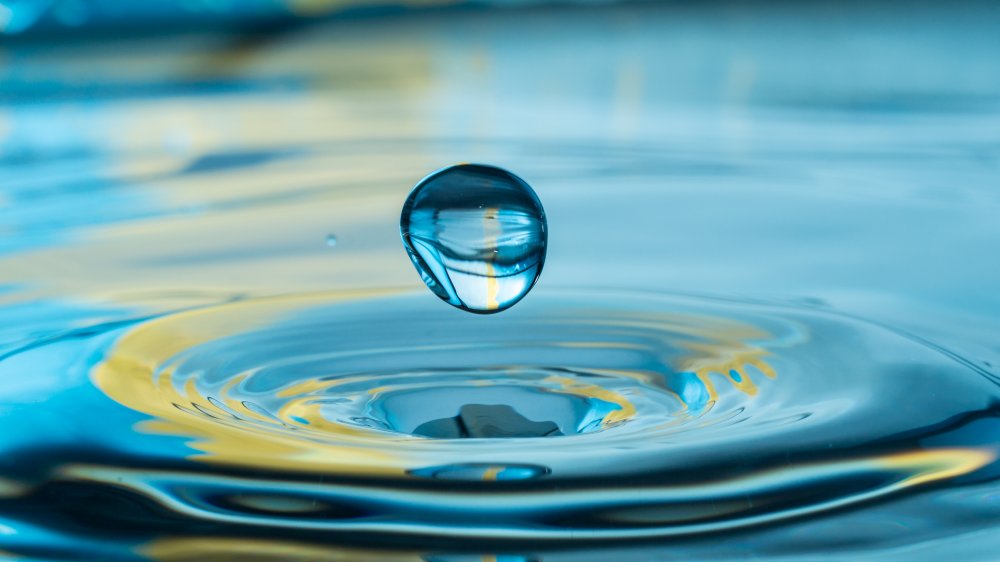The Secret Ingredient You Didn't Realize Was Used To Make Jack Daniel's
If Westerns are to be believed, the first American settlers in the Wild West drank more whiskey than water. It's so important to American culture, that in 1794, we literally rebelled against our founding father, President George Washington, over whiskey (via History). Face it. There is no liquor more American than whiskey. And while America makes a lot of whiskeys, Jack Daniel's is, perhaps, the most famous. Need proof? In sheer numbers, Jack Daniel's sold 13.3 million, 9-liter cases of its whiskey in 2018 (via Statista). If numbers don't sway you, maybe music will. Rumor has it that the great Frank Sinatra wouldn't let a concert go by without toasting with a glass of Jack (via The Spirits Business).
The only logical conclusion is that you can't beat the taste of Jack Daniel's. But why? The answer lies in its distillation process, the so-called "Lincoln County Process." The process dates back hundreds of years and depends on a secret ingredient (via Discover).
What's Jack Daniel's Secret ingredient?
Charcoal. Really, it's two things: charcoal and the knowledge passed down from an African American slave, Nearest Green. Here are the CliffNotes. Historians now believe that slaves brought over a version of Jack Daniel's distilling technique from West Africa, where it's not uncommon to cook foods and filter drinks over charcoal (via Gastropod). Nearest Green, who undoubtedly inherited these techniques from his ancestors, worked as Jack Daniel's first distiller (via the About Nearest Green). Three of his children, George, Lewis, and Eli, and three of his grandchildren, Ott, Charlie, and Otis, carried on the tradition.
The Greens would teach Jack Daniel that filtering whiskey through charred sugar maple dramatically changes its taste. Why? There are roughly 35 different aromatic compounds in whiskey distillate. Filtering freshly distilled, unaged whiskey over charcoal mellows the liquor's taste by reducing the strength of some of these by up to 50 percent.
Jack Daniel's isn't the only liquor to use charcoal
It's not actually as novel as it sounds. As it turns out, charcoal is also commonly used to remove impurities and polish the flavor of vodka. But while Jack Daniel's uses maple, vodka distillers prefer silver and birch (via Spirits Distilled). Tequila has also jumped on the charcoal-filtering bandwagon. The Internet is buzzing about "Cristalino" a new, clear category of tequila that Men's Journal describes as "rich," "complex," and "herbaceous," without the stronger notes associated with traditional añejo Tequilas. Can you guess its secret? It's filtered over activated charcoal (via Forbes).
But if charcoal filtering in and of itself is nothing new, there must be other secrets behind Jack Daniel's exquisite taste profile.
First, it's important to understand there are certain standards a distiller must uphold in order for a bottle of whiskey to achieve the rich, smooth, woody tastes associated with Tennessee whiskey. For one, it must be distilled from at least 51 percent corn. For two, it must be filtered through maple charcoal. And for three, it must be aged in new charred oak barrels and bottled at over 80 proof (via Time). Jack Daniel's, of course, isn't just any-old Tennessee whiskey. That's thanks to what may be a third, secret ingredient.
So what is Jack Daniel's other secret ingredient?
The water. According to Jack Daniel's, they use fresh, limestone spring water from Cave Spring Hollow, Lynchburg, Tennessee in their distilling process. The iron-free water runs, year-round at about 56 degrees Fahrenheit (via New Food Magazine). So what? It's not just dumb luck that Jack Daniel's is located next to Cave Spring Hollow. Instead, Jack Daniel founded his distillery based on the location of the spring alone. And when you know a little bit more about the distilling process, you can truly appreciate the importance of water. As Artisan Spirit Magazine explains, clean water with low alkaline levels are vital to healthy fermentation. Because yeast loves minerals, the water's mineral content also aids the fermentation process.
As far as we know, Jack Daniel's hasn't played around with using different kinds of water in their distillation process. But in 2015, a group of gin distillers did. According to Wired, (as reported by Distiller), the same distillers made the same gin six times. The only difference? Each time the distillers used six different kinds of water, from French mineral spring water to tap water. As expected, tasters noticed the differences. Some gins came out with "bright floral notes," some "full-bodied," and some "cloying." The experiment was not scientifically reviewed, but its results are nonetheless compelling. Water matters.
So, is Cave Spring Hollow Jack Daniel's big secret? We don't know what, exactly, makes Jack Daniel's taste so distinctive. We do know, however, that it is something special.



